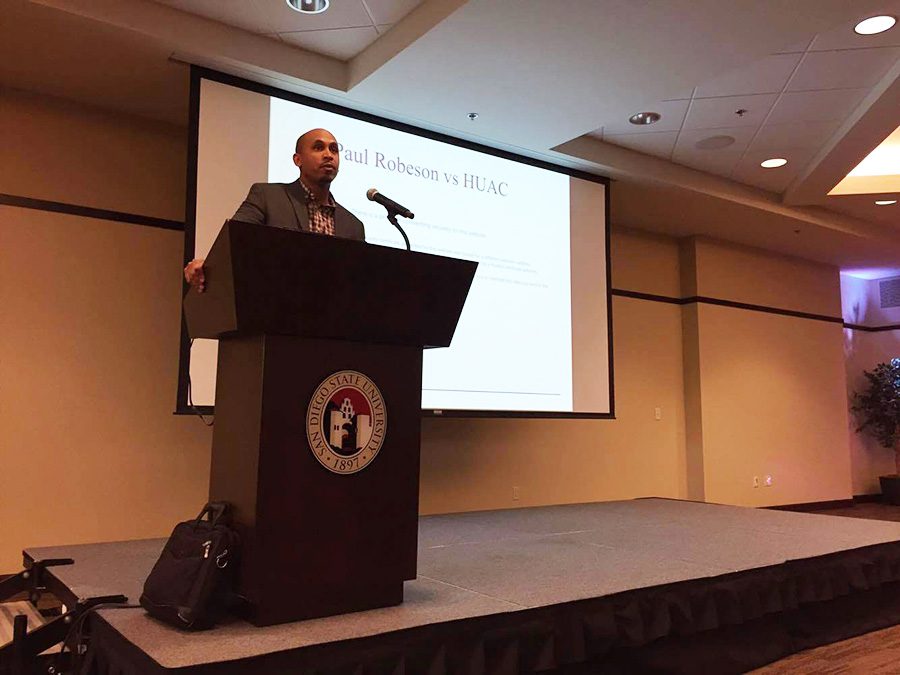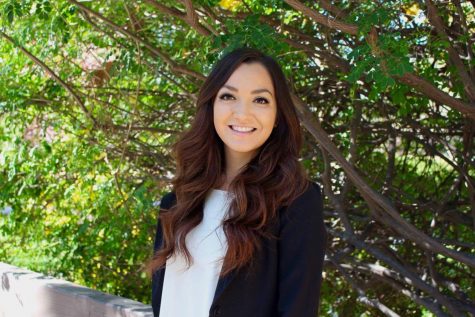As part of Black History Month Speaker Series, keynote speaker and San Diego State alumnus Alhaji Conteh showed those in attendance that history does repeat itself and lessons learned in the past can be applied to current social struggles.
Conteh presented his dissertation, “Forging a New African: Black Internationalism and the Council on African Affairs, 1937-1955,” on Feb. 23 in the Parma Payne Goodall Alumni Center.
Conteh graduated from SDSU with a Bachelor of Arts in Africana Studies, received his Master from Temple University and earned his Ph.D. from Howard University.
Africana Studies assistant professor Antwanisha Alameen-Shavers met Conteh during his time at SDSU and she said she greatly admired his passion for justice.
Conteh’s dissertation focused on the Council on African Affairs, a group that worked to inform citizens and policy makes on issues in Africa, lobbied U.S. government and provided resources to those who were under scrutiny for their political beliefs.
Conteh said the greatest lessons to learn from the council were the importance of international solidarity, alternative news sources and progressive politics.
“Issues such as police murders and the movement for black lives (are) not something that should only be limited to U.S. borders,” Conteh said.
He said among leaders of the Black Lives Matter movement, the topic of international solidarity is becoming more apparent, such as when one of the leaders of it spoke at the United Nations.
Business junior Renae Wallace said Conteh’s idea of international solidarity resonated with her most.
“We are in a time when black people are speaking about a lot of issues,” Wallace said. “Black people are being oppressed all around the world.”
Conteh’s idea of international solidarity stems from the council’s focus on the oppression of individuals all around the world, not just the United States.
Conteh encouraged students to seek alternative news outlets. He pointed out the portrait of colonialism in African countries by media organizations that lacked an “African perspective”.
“We need to keep various alternative news sources open and the internet open as well,” Conteh said.
Journalism junior Ayinde Okolo said he believes the portrayal of the Black Lives Matter moments tends to be negative, and it can have a negative effect on people.
Conteh’s last point included the lessons that can be learned from the CAA on progressive politics.
“It’s the time now to build another alternative, whether that’s the Green Party or something else,” Conteh said. “I think that one of the main things that we should do when we encounter lessons like this from history is to take head and attempt to implement those lessons.”
Conteh said whether the issues at hand are immigration bans, war or police brutality, it would be beneficial to use international solidarity to address those concerns.
Conteh encouraged students to get involved in organizations they felt passionate about if they wanted to see change.
Conteh ended his presentation by encouraging students to seek alternative news sources.
“To have a counter narrative to the mainstream media is always important,” Conteh said. “The New Africa newsletter and the Council on African Affairs’ work really demonstrated that.”









